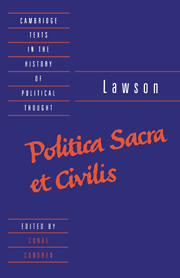Book contents
- Frontmatter
- Contents
- Preface
- Editor's introduction
- A note on the text
- Bibliographical guide
- Biographical notes
- Principal dates
- Politica Sacra et Civilis
- Epistle to the reader
- Dedicatory poem
- The arguments of the several chapters
- 1 Of government in general, and the original thereof
- 2 Of government in general, and of a community civil
- 3 Of an ecclesiastical community
- 4 Of a commonwealth in general, and power civil
- 5 Of the manner how civil power is acquired
- 6 Of power ecclesiastical
- 7 Of the manner of acquiring ecclesiastical power
- 8 Of the disposition of power civil, and the several forms of government
- 9 Of the disposition of ecclesiastical power: and first, whether it be due unto the bishop of Rome
- 10 Whether the civil state have any good title to the Power of the Keys
- 11 Whether episcopacy be the primary subject of the Power of the Keys
- 12 Whether presbytery or presbyters be the primary subject of the Power of the Keys
- 13 That the government of the church is not purely democratical, but like that of a free state, wherein the power is in the whole, not in any part, which is the author's judgement
- 14 Of the extent of a particular church
- 15 Of subjection in general, and the subjects of a civil state
- 16 Of subjects in an ecclesiastical polity
- Index
- Title in the series
16 - Of subjects in an ecclesiastical polity
Published online by Cambridge University Press: 05 June 2012
- Frontmatter
- Contents
- Preface
- Editor's introduction
- A note on the text
- Bibliographical guide
- Biographical notes
- Principal dates
- Politica Sacra et Civilis
- Epistle to the reader
- Dedicatory poem
- The arguments of the several chapters
- 1 Of government in general, and the original thereof
- 2 Of government in general, and of a community civil
- 3 Of an ecclesiastical community
- 4 Of a commonwealth in general, and power civil
- 5 Of the manner how civil power is acquired
- 6 Of power ecclesiastical
- 7 Of the manner of acquiring ecclesiastical power
- 8 Of the disposition of power civil, and the several forms of government
- 9 Of the disposition of ecclesiastical power: and first, whether it be due unto the bishop of Rome
- 10 Whether the civil state have any good title to the Power of the Keys
- 11 Whether episcopacy be the primary subject of the Power of the Keys
- 12 Whether presbytery or presbyters be the primary subject of the Power of the Keys
- 13 That the government of the church is not purely democratical, but like that of a free state, wherein the power is in the whole, not in any part, which is the author's judgement
- 14 Of the extent of a particular church
- 15 Of subjection in general, and the subjects of a civil state
- 16 Of subjects in an ecclesiastical polity
- Index
- Title in the series
Summary
Of subjection in general, and subjection to a civil power, I have spoken; and because there is an ecclesiastical power and subjection due unto it, therefore order requires, that I conclude the first part of politics with the explication of the nature of spiritual subjection and subjects. This spiritual relation and duty arising from it presupposeth subjection […] absolute to God as creator and preserver; […] to him as redeemer, [and] to Christ as head and universal administrator of the church. [It is owed] to him [also] as having instituted an ecclesiastical discipline, and promising to every particular church, using the Keys aright in their judicial proceedings, to be with them so, as to make their judgement effectual; and that what they bind on earth shall be bound in Heaven, and what they loose on earth shall be loosed in Heaven. So that this subjection is due to the power of Christ in every particular visible church. For, when a multitude of Christians associate, and according to the rules of Christ erect an independent judicatory, it's the duty of everyone in that association to submit unto it, if he will be a member of the same, and enjoy the benefit of that external government: and by the very institution of Christ, though there be no solemn confederation, they are bound so to do. This subjection is different from that, which is due from the people to their proper pastors.
- Type
- Chapter
- Information
- Lawson: Politica sacra et civilis , pp. 252 - 275Publisher: Cambridge University PressPrint publication year: 1993



